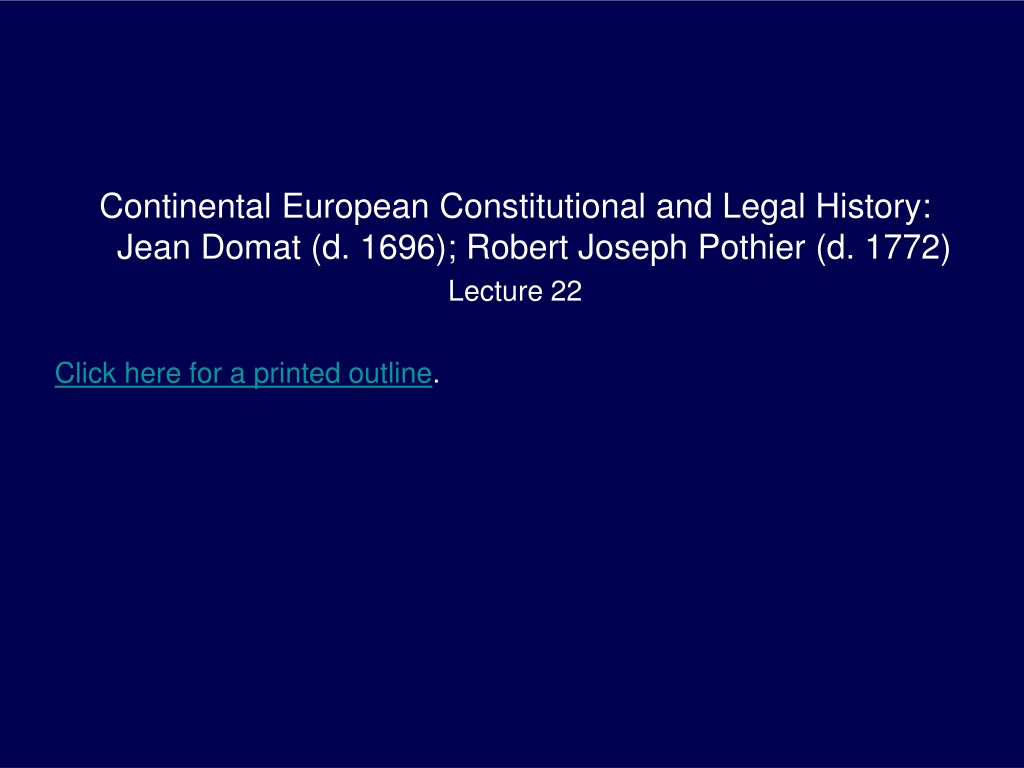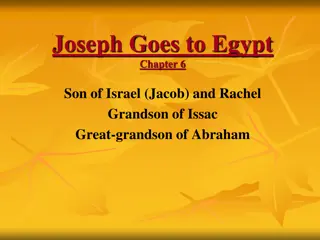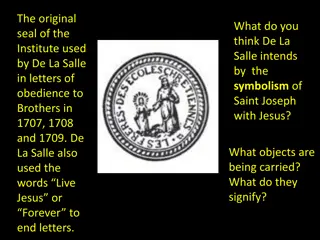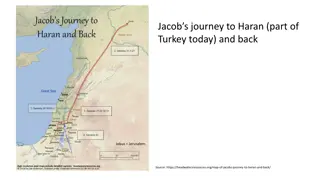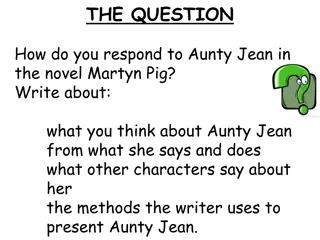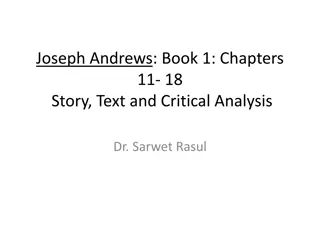The Outstanding Legal Minds: Jean Domat and Robert Joseph Pothier
Explore the lives and works of Jean Domat and Robert Joseph Pothier, prominent French jurists of the late 17th and mid-18th centuries. Domat focused on founding law on ethical principles, while Pothier's significant contributions include the Pandectae Justinianae. Learn about their radical simplifications in legal systems and lasting influence in the field.
Download Presentation

Please find below an Image/Link to download the presentation.
The content on the website is provided AS IS for your information and personal use only. It may not be sold, licensed, or shared on other websites without obtaining consent from the author. Download presentation by click this link. If you encounter any issues during the download, it is possible that the publisher has removed the file from their server.
E N D
Presentation Transcript
Continental European Constitutional and Legal History: Jean Domat (d. 1696); Robert Joseph Pothier (d. 1772) Lecture 22 Click here for a printed outline.
Introduction: Jean Domat (16251696) This lecture focuses Jean Domat and Robert Joseph Pothier, the most prominent of the French jurists of the late 17th and mid 18th centuries respectively. First, a word about these two guys whom we ve mentioned a number of times before. Jean Domat was born in 1625 and died in 1696. Louis XIV was king for most of his adult life. He was friend and intimate of Blaise Pascal and the Jansenists at Port Royal. He became a Jansenist and remained one all his life, though he was perhaps not so gloomy as some of the Jansenists. Domat sought to found law on ethical principles, as he says in his Treatise on the Laws (Trait des loix) that precedes the Lois civiles. He wrote a selection of laws from the Digest, a form of literature we ll talk about more when we come to Pothier, and then his major work Lois civiles dans leur ordre naturel, The civil laws in their natural order. Later he wrote four further books on public law. He was a practicing lawyer, king s advocate at Clermont Ferrand. He is remembered as a systematizer.
Introduction: Jean Domat (16251696) (contd) Let us say a word about Domat s system before we get to the specifics. The striking thing about Domat s system is its radical simplicity. All of private law is divided into two parts, engagements and successions. Engagements is broader than our word contract . It includes all interpersonal relationships whether formed by agreement or not, but the focus is on agreement. Hence, as is typical in French law, the law of wrongs (delicts, torts) is downplayed. Domat may be first person to have seen what Hohfeld later perceived, that all law deals with relationships between persons. Property thus becomes an extraneous category. This was too radical for the codifiers as we will see when we talk about the Napoleonic Code, but its influence was felt. Domat s work on public law is less successful. It begins with a very long book on government in general, and it is followed by a book on officers, also quite long. These are followed by very skimpy books on crimes and delicts and one on the ordo iudiciarius, which is the most disappointing of all. They were written at the end of his life, and he was clearly running out of steam. The first two books might be worth more study than I have ever been able to give them. There is a recent monograph that focuses on them.
Introduction: Robert Joseph Pothier (16691772) Robert Joseph Pothier was born in 1699, three years after Domat s death, and he died in 1772. His life was thus spent almost entirely in the reign of Louis XV. He was Conseiller au Pr sidal of Orl ans, a judge of an important local court, for 50 years. In 1748, he published the Pandectae Justinianae in novum ordinem digestae, the Pandects of Justinian digested in a new order. That is to say, he published virtually nothing until he was 49. The Pandectae was a hugely successful work that earned Pothier the attention of Chancellor d Aguesseau. Under his patronage, Pothier became a professor of French law at Orl ans in 1749. Starting in 1761, at the age of 62, he published nineteen treatises: obligations, sale, hire, maritime hire, partnership, loan, deposit, mandate, negotiorum gestio, pledge, contingent contracts, insurance, bottomry bonds, gaming contracts, marriage, community property, dower, property, and possession. His printer couldn t keep up with him; some of these works were published posthumously.
Introduction: Robert Joseph Pothier (16691772) (contd) Pothier was also interested in theology, and in this regard, unlike Domat, he was orthodox (though in church government he has decidedly Gallican tendencies). I agree with Alan Watson when he says that the natural law in Pothier owes as much to Thomas Aquinas as it does to the natural law school, although Pothier knew the work of Pufendorf, Thomasius, and Wolff. Pothier as a general systematizer is not as well known as Domat. The reason for this is that by and large he followed the titles of the Digest and the Code, adding material, particularly in commercial law, that was not covered or only briefly covered in the Roman law, with titles drawn from customary law and from mercantile and maritime law. He made no major contribution to the overall organization of private law. Whether something of interest is going on in P s work on the question of organization is probably best seen when we get to his work on marriage, which we will do shortly. .
Domat on marriage Domat on the topic of marriage is interesting. He sharply distinguishes two engagements in marriage, one in the divine institution, which he expressly says is outside the scope of his book, the other in the engagement concerning goods, which he proceeds to treat with special emphasis on the Roman institution of dowry. The notion that the secular rules and the religious rules about marriage might have quite different consequences goes all the way back to Azo in the early 13th c., but Domat states it with a kind of precision that is unusual, not only unusual but perhaps courageous. He does not say so, but one might conclude from his discussion that the ordonnance of Blois was invalid, at least insofar as it purported to invalidate certain canonically valid marriages. .
Pothier on marriage Pothier is much fuller on the topic of marriage. (He has 3 treatments, one in the Pandectes and 2 in Contrat de mariage, the treatise on the conract of marriage). Before we get to what he says about the rules, we ought to pause and consider the way he organizes them. The outline of the title in the Pandectes is quite clear. We deal first with the form of contracting nuptials. We ask first (article 1), whose consent is required, and subsections deal with the consent of the parties and the consent of those in whose power they are. We then deal (article 2) with the question whether anything more than consent is required. Secondly, we deal with the capacity to contract marriage. Similarly, we consider first the requirements of citizenship and puberty, then people who are absolutely prohibited from contracting marriage, then those prohibited from contracting marriage with each other, and finally with the penalties for incestuous and illicit marriages. This type rearranging of the Diget has a long history in France. It clearly goes back to the systematizers of the 16th century, men like Fran ois Conan, Fran ois Douaren, and Hugh Doneau, all of whom made contributions to this effort to organize the Roman materials. Domat s selection of material from the Digest was probably Pothier s starting point, but he weaves his material together with considerable commentary that makes it much clearer than does Domat what he is making of it.
Pothier on marriage (contd) Pothier s discussion in the Pandectes of the Roman rules on marriage owes much to the Dutch elegant jurisprudents and the French humanists, particularly Barnab Brisson s De ritu nuptiarum( On the rite of nuptials ), which was first published in 1564. He is much more aware than previous authors in the tradition of practical law how much the Roman texts are formed by a Roman context that is no longer applicable. Hence, his discussion of Modestinus famous definition of marriage is informed by an understanding of the archaic Roman institution of marriage with manus, something that had really not been known until the 16th century. He also, like many Romanists before him, notices how strong the Romans are on the necessity of parental consent, and there is no reason that he can see why this rule should not be applicable in his own day.
Pothier on marriage (contd) When we come to Pothier s treatise on the contract of marriage, this concern with parental consent comes to the fore. But first he must deal with the problem of religious and secular. Marriage is divine in origin, Pothier tells us. The beginning of his treatise with Adam and Eve goes right back to the medieval theologians and canonists, as does his emphasis on the unity of spirits rather than the unity of bodies. He also, as does Domat, separates the property consequences of marriage from the marriage itself. Indeed, he devotes two separate treatises to the property consequences, one on dower and one on community property. When he comes to the issue of secular power, however, he unites the two laws in a most medieval way. Law is law, whether it proceeds from secular or religious power, and while the positive law cannot change the essence of marriage, it can prescribe the formalities and dictate who is and who is not capable of marriage. His reading of the ordonnance of Blois is broad, that is to say, where the policy has been fulfilled, the specifics do not have to be. Hence, the statute does not apply where publicity has been had, even if not in quite the same way that Blois had prescribed. By contrast, when the ordonnance of 1639 that required parental consent for the promulgation of banns is read together with the ordonnance of Blois, there is no doubt in Pothier s mind that marriages without parental consent are void.
Pothier on marriage (contd) His argument to this effect is quite tendentious: The council of Trent lays down an anathema on those who say that the marriage of children of families contracted without the consent of their parents is null. The council, as M. Boileau has well observed in his Treatise on the impediments to marriage, intends only to condemn the opinion of certain Protestants who pretend that by natural law parents have on their own the power to validate or annul the marriages of their children contracted without their consent, without there being necessary for this that there be a positive law that declares them null. But the council did not nor could it decide that in the case of civil law that requires the consent their parents, on pain of nullity, their marriages contracted without the consent of their parents, are nonetheless valid. Monsieur Boileau is Jacques Boileau (1636 1716). His Trait des empechemens du mariage was published in Cologne in 1691. Boileau was a learned canonist, a Gallican, but not as extreme as were some of his contemporaries. The treatise on impediments defends the views of his older contemporary, Jean Launoy, but without the ferocity of the latter. It is interesting that Pothier cites Boileau rather than the much better-known Launoy.
Pothier on marriage (contd) The power that secular authority, Pothier continues, has to prescribe for the contract of marriage, just like all the other contracts, such laws that it judges appropriate, the non-observance of which renders the contract null, is a power which is essentially attached to it, which it holds from God, and of which the church has never wanted to deprive it, according to what we have established in the first part of this treatise. Pothier s reference to the section entitled Of the authority of secular power over marriage in the first part of the treatise is worth quoting extensively: The marriage that the faithful contract, being a contract that Jesus Christ has elevated to the dignity of a sacrament to be the type and the image of his union with his church, is at once a civil contract and a sacrament. That marriage is a contract that Christ has elevated to the dignity of a sacrament is a commonplace in Roman Catholic writing on marriage from the 16th century to the present day, though the phrase itself is not found in the decrees of the council of Trent. The phrase is most often used in the 16th century in the context of disputes with Protestants who denied the sacramentality of marriage.
Pothier on marriage (contd) Since marriage, Pothier continues, is a contract, belonging like all other contracts to the political order, it is as a result subject to the laws of the secular power that God has established to regulate all that belongs to government and to the good order of civil society. Since marriage is the contract of all contracts that most concerns the good order of that society, it is all the more subject to the laws of the secular power that God has established to govern that society. Secular princes, therefore, have the right to make laws about the marriage of their subjects, either to forbid it to certain persons or to regulate the formalities that they judge appropriate to be observed in order to contract it validly. Pothier quotes at this point the Spanish neo-scholastic Tomas S nchez conveniently omitting that S nchez had held that the church had withdrawn from secular princes the power that they would otherwise have to establish the terms of the contract.
Pothier on marriage (contd) The marriages, Pothier continues, that persons subject to these laws contract against their [the laws ] provisions, when they carry the pain of nullity are entirely null, following the common rule for all contracts, that every contract is null when it is made contrary to the disposition of the laws: no contract, no agreement is contracted if the law prohibits it. The last phrase is a Latin maxim. It is no different, Pothier continues, in the case of the sacrament of marriage, for the sacrament cannot exist without the thing which is its matter. The civil contract being the matter of marriage, there cannot be a sacrament of marriage when the civil contract is null, just as there cannot be a baptism without the water which is the matter of it.
Pothier on marriage (contd) That sacraments consist of both form and matter is a commonplace in western sacramental theology from at least the 13th century. In baptism, for example, the form is I baptise you in the name of the Father, the Son, and the Holy Ghost, and the matter is the water. The medieval theologians had some difficulty separating the form from the matter in marriage. After the council of Trent, one could take the formula prescribed, but not required, by the council, I join you together in matrimony, in the name of the Father, and of the Son, and of the Holy Ghost, as the form and the consent of the couple as the matter, but that view was not common. More common, at least today, is the view that the matter is the expression of consent by the man and the woman and the acceptance of that consent by the other in presence of the church as form. Pothier s sacramental theology here is out of the mainstream but cannot be called heterodox. Let us now return to Pothier s argument in part 2 of the treatise.
Pothier on marriage (contd) Following the Roman laws, the marriages of children of families were not valid without the consent in advance of him who had them in their power. [There follows a number of apt citations to Roman law.] Never has the church opposed these laws; never has she regarded as valid marriages contracted contrary to their disposition. On the contrary she has regarded them as fornications. This is what we find in the second canonical letter of St. Basil to Amphilochus, canon 42, where this father says that the marriages of slaves and those of children of families, contracted without the consent of him in whose power they are, are fornications rather than marriages until their consent intervenes: Marriages that happen without those who have power [over the couple] are fornications; during the lifetime of the father or owner they who so come together are not free from accusation until the owners consent to the marriage; then the marriage becomes fixed . This was the doctrine of the church on this topic at the time of Isidorus Mercator, because in the decretal that he falsely attributes to Pope Evaristus and which is reported in the Decretum of Gratian [C.30 q.5 c.1] he calls marriages made without the consent of parents adulteries, concubinages, lusts or fornications .
Pothier on marriage (contd) The canon, attributed to St. Basil, is found in a number of canonical collections of the Eastern Church. So far as I am aware, it does not appear in any Western collections. Basil s Opera omnia were published in a Latin translation in Paris by J. Garnier and P. Maran, in 1721 1730. That is probably the source of Pothier s Latin translation of the extract. The Eastern Church, as we have seen, had very different views about the formation of marriage than did the Western. The canon of pseudo-Evaristus we have seen many times before. That it holds that marriages without parental consent are not be treated as marriages is a possible reading of the text, though that is not the way that Gratian read it, nor did Western canonists after his time.
Pothier on marriage (contd) To prove that the council of Trent, Pothier continues, in declaring valid marriages clandestinely contracted by children of families without the consent of their parents, nor that it considered them in any case other than the one in which there was no positive law that prescribed otherwise, M. Boileau, again, draws this argument from these words so long as the Church has not declared them invalid . Hence, the spirit of the council is that the church could render them null if at length it though it appropriate to make a diriment impediment the lack of consent of the parents. The proposal was even made to the council by the French bishops, according the account of Fra Paolo, to make a decree declaring such marriages null. It did not pass. But if the church has this right, even more so ought the secular power have it, since the contract of marriage belongs just like all other contracts to the political order. The right to prescribe laws that it judges appropriate to establish the validity of this contract belongs principally to the secular authority.
Pothier on marriage (contd) It is interesting that Pothier does not mention the fact that the decrees of the council of Trent were not published in France, and, hence, were not law even in his time. He probably does not mention it because that would lead him into pre-Tridentine law, which was, perhaps, even clearer than was Trent that parental consent was not required for a valid marriage.
Pothier on marriage (contd) In order, Pothier continues, to convince one s self even more that the spirit of our laws is to regard as null the marriages of minors contracted without the consent of their father and mother one can draw an argument from the second disposition of article 40 of the ordonnance of Blois, reported above no. 78, which provides that the dispensation of someone from the proclamations of banns can be granted only with the consent of the principal relatives of the contracting parties, and by consequence of their father and mother, and of the disposition of the declaration of 28 September 1639, reported above, no. 76, which requires the consent of the father and mother, tutors and curators, in order to make a proclamation of the banns of marriage. If these laws require the consent of the father and mother of minors in order that their banns be validly published, if they require it for the dispensation from the banns, in order that they be validly obtained, is it not evident that the spirit of these laws is to require for even greater reason that consent of the father and mother to the marriage of minors in order that it be validly contracted? The marriage is something of much greater importance than the proclamation of the banns and the dispensations, and consent is being required for the proclamations of the banns and for the dispensations only in order to arrive at the end that the minors cannot validly contact marriage without the consent of their father and mother.
Pothier on marriage (contd) The argument about the ordonnances, though plausible, is not inevitable. The fact is that neither Blois nor the ordonnance of 1639 expressly requires parental consent for the validity of marriages. When we dealt with those ordonnances, we suggested that perhaps there was some doubt, even in a Gallican context, whether a secular ordonnance could set conditions on the validity of a sacrament. Pothier has no doubt hence, his opinion. What will happen to Pothier s ideas when there is a radical secularization of marriage can be seen in the Napoleonic code of 1804. Banns and parental consent, at least for minors, are all retained as a condition of validity. What is changed is where the ceremony takes place. It now takes place before a civil officer, traditionally in France, the mayor of the town in which the couple resides. Couples in France today still go to church for a marriage ceremony but they do so after they have visited the mayor s office, and the church wedding, or its absence, has no secular legal effect.
Domat and Pothier on witnesses Domat takes some time to consider the problem of witnesses. In this he is unusual for authors of his period. What he has to say, however, is not particularly interesting. Very little that he says, except for a few references to Colbert s ordonnance on civil procedure, would have surprised Tancred. Indeed, the law seems to be in a kind of time-warp, incapable of moving beyond the achievements of the medieval proceduralists. On the question of discretion, which we have suggested is the key issue in this matter, Domat is less open to discretion than is Tancred. Notable in Domat s citations is the fact that he uses only citations to Roman law, pretending that the elaborate medieval learning that he reports had all been derived from Roman law. To a certain extent this is the result of his method. Pothier says nothing about witnesses at all in his treatises, though there is a title about witnesses in the Pandectes.
Domat on wild animals Finally, what do our authors say about wild animals? Domat says very little. He clearly knows the Roman rules. He regards them as quite irrelevant. The relative unimportance of property in his scheme of things means that he need not treat the occupation of wild animals as somehow constitutive of something very important. (He does come back to wild animals when he considers possession, 3.7.1.7, p. XIX 15.) The interesting thing is that when the Napoleonic code 1804 comes back to property as an organizing priciple, it does not come back to wild animals. This tells us much about the positivistic bias of the Napoleonic code.
Pothier on wild animals Pothier on the topic of wild animals is interesting. His discussion of the topic is quite long, and it contains a number of surprises: Like Locke, but with somewhat more emphasis on the religious, Pothier begins God has the sovereign dominion of the universe and everything that it contains: The Lord s is the earth and its fullness, the world and all that is contained therein. [Ps. 24(23):1 2.] He created the earth and all the creatures that it contains for humankind and granted them a dominion subordinate to his own: What is man , writes the Psalmist, that you are mindful of him? . . . You have set him over all the works of your hands, you have made everything subject to his feet. (Ps. 8:4, 6). God made that declaration to human kind by the words that he addressed to our first parents after their creation: Multiply and fill the earth and subject it and dominate the fish of the sea. (Gn. 1.28).
Pothier on wild animals (contd) The first men, Pothier continues, had then all the things that God had given humankind in common. That community was not a positive community, such as the one that exists among several persons who have in the common the ownership of thing in which they have each their part, it was a community which those who have treated of these matters call a negative community, which consisted in that these things which were common to all belonged no more to one of them than to the others and in that no one could prevent another from taking from among these common things that which he judged fitting to take in order to satisfy his needs. While he was satisfying his needs with it, the others were obliged to leave it to him, but after he ceased to satisfy his needs with it, if the thing were not one of those which were consumed in the use that one made of them, that thing returned to the negative community and another could satisfy his needs with it in the same manner.
Pothier on wild animals (contd) Humankind having multiplied, men divided the land and the majority of things that were on the surface among themselves. That which fell to each of them began to belong to him to the exclusion of others. That was the origin of the right of property. . . . So far as wild animals are concerned, ferae naturae, they remained in the ancient state of the negative community. All those things that remained in the ancient state of negative community are called res communes, by reference to the right that everyone has to seize them; they are also called res nullius, because no one has property in them so long as they remain in that state and cannot be acquired except by seizing them.
Pothier on wild animals (contd) Pothier next takes up the question of what the Roman law of the chase was. He notes the basic proposition that conforming to the natural law, Roman law made the chase available to everyone. He correctly interprets D.41.1.3.1 as making it irrelevant whether the capture took place on the hunter s property or on another s land. He notes, as does the same Digest passage, that the landowner may, however, prohibit the hunter from entering on his land (which he notes as a consequence of land-ownership), and he raises, as had many before him the question of what happens if the hunter takes game despite the prohibition. Cujas, he tells us, would decide the question in favor of the property owner (as had Accursius 500 years earlier), but Vinnius (a Dutch writer roughly contemporary with Voet) decides the case in favor of the huntsman giving the landowner an actio iniuriarum: because, Pothier tells us, being the owner of the land he has the right to prevent him [the huntsman] from passing over it, but not being the owner of the wild animals which the hunter has taken on his land he has no reason to prevent that the hunter acquire in it [the game] the ownership by seizing it.
Pothier on wild animals (contd) Pothier goes on to point out that the Romans did not require actual manucaption. He quotes the case of the boar that fell into the trap at length and seems to draw the conclusion that it belongs to the trapper if it cannot get out. He notes that in French law someone who wrongfully sets a trap on another s land cannot claim ownership in the game.
Pothier on wild animals (contd) Pothier then proceeds to consider the question of wounding and of interference with the hunt. He notes the conflict between Trebatius and Gaius on the topic. He makes no mention of how Justinian resolves the question. He then reports Pufendorf s resolution, which he describes as allowing the huntsman an action if the wound was considerable (consid rable) and the animal could not escape. He then reports Barbeyrac s opinion that pursuit alone is enough and concludes: Barbeyrac . . . thinks that it suffices that I be in pursuit of the animal, even though I not have already wounded it, in order that I be regarded as the first occupant, with the result that another will not be permitted to seize it from me during this time. This idea is more civil; it is followed in usage; it conforms to an article of the ancient laws of the Salians (5.35): where it is said: If anyone kills and steals a tired wild boar whom another s dogs have stirred, let him be adjudged liable for 600 denarii .
Pothier on wild animals (contd) So far Pothier has been quite consistent. He has grounded the privilege of the huntsman in a divine grant as a matter of natural law, and he has supported the huntsman at every turn. He prevails over the landowner even when he is expressly forbidden from entering onto the land. He prevails over the later huntsman, following a much more Lockean than Hobbesian version of the story. When Pothier gets to the law of France, however, he is surprising. This broad right of the huntsman does not apply in France. Hunting rights are restricted to the nobility. Proprietary rights prevail everywhere over poachers. How can this be? Some of the old doctors have doubted whether the sovereigns had the right to reserve hunting for themselves and to forbid it to their subjects. They argue that God having given men power (l empire) over beasts, as we have seen above, the prince had no right to deprive his subjects of the right that God had given them. The natural law, one says, permits everyone to hunt; the civil law that forbids it is contrary to the natural law and exceeds, by consequence, the power of the legislator, who is himself subject to the natural law and cannot ordain the contrary to that law.
Pothier on wild animals (contd) It is easy, Pothier continues, to respond to these objections. From the fact that God gave power over the beasts to humankind it does not follow that it ought to be permitted to every individual member of human kind to exercise that power. The civil law ought not to be contrary to the natural law. That is true with regard to what the natural law commands or that which it forbids. But the civil law can restrain the natural law in that which it only permits. The majority of civil laws do nothing but make restrictions on what the natural law permits. That is why, although in terms of pure natural law, the hunt is permitted to every individual, the prince was within his rights to reserve it to himself and [grant] it to a certain kind of person and forbid it to others. Hunting is an exercise likely to turn peasants and artisans from their work and merchants from their commerce. It would be useful and for their proper interest and for the public interest to forbid them from it. The law which forbids hunting is therefore a just law which it is not permitted to those who are forbidden from it to contravene either in the forum of conscience or in the external forum.
Pothier on wild animals (contd) The notion of the permission of the natural law goes back to the first glossators of canon law, when they were seeking to justify property. Though I cannot recall having seen this argument in medieval authors with regard to wild animals, a medieval jurist would certainly have understood it. I d like to close my reflections on Pothier on property with a passage that I found quite by chance because someone had marked it in my copy. In his general discussion of occupation, Pothier turns very briefly to the question that had plagued the Spanish scholastics in the 16th century: the justification for the conquest of the New World. Like all of his predecessors, Pothier says that a seaman who discovers an uninhabited land may occupy it and claim it for his own. If he claims it in the name of the prince, property in it passes to the prince. But when a land is occupied, Pothier continues, however wild [the French word also means savage ] the men who inhabit it appear to us, these men being the true proprietors, we cannot without injustice establish ourselves there against their will. When Pothier wrote this, France had lost most of her possessions in the New World as a result of the Seven Years War. It is hard, however, not to see here the very best of the medieval tradition of natural law coming to the fore.
Conclusion I think I have said enough to suggest that while there is much in Domat and Pothier that could be used by a group who were interested in codifying French law, there is nothing in what they do that inevitably leads to codification. Domat is interested in system in the broad. Pothier is interested in it in the small, and not particularly interested in it in the broad. Both of them know Roman law quite well. Domat s interest in natural law leads him in the direction of ethics and of system. He is not particularly interested in the scholarly debates of the natural lawyers, which were only beginning in his time. Nor is he interested in the debates of the historians, which were more of concern in his time. Pothier is interested in both. By and large, he uses his history well. Pothier is also interested more in the specifics of natural law. He seems to us broader, somewhat more humane than Domat, though that may tell us as much about the respective centuries in which they lived as it does about their respective personalities and beliefs.
Conclusion (contd) But my overall point is that both men are in the tradition of the ius commune. I do not think that a fair reading of either of them would allow one to predict the so-called exegetical school of the French 19th century. One could perhaps see the German pandectists of whom we will talk in a later lecture. Perhaps one can see them coming more out of Domat than out of Pothier. Perhaps one of the most ironic disoveries of this course is that in some sense the Middle Ages ended in 18th century France, with a man who had great influence on the French civil code (there are whole sections of Pothier taking over into the code unchanged), but who, when we read him in context, appears much more medieval than does his predecessor of a century earlier.
